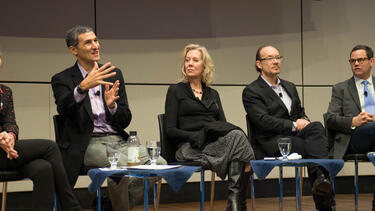What Do Social Entrepreneurs Do?
Four Yale SOM graduates who have founded and run organizations—both for-profit and nonprofit—that aim to have large-scale social impact talked about their experiences in the fast-developing field of social enterprise.

When Seth Goldman ’95 was a Yale SOM student, he told an audience at the Business + Society conference, he wouldn’t have been surprised to learn that he was destined to run an organization promoting fair trade, organic farming, and healthy eating. But Goldman, the co-founder, president, and TeaEO of Honest Tea, would have been surprised to learn that it would be a for-profit firm, now part of Coca-Cola.
“I would have asked, what’s the name of the nonprofit or the government entity that I’m running?” he said. “I never would have guessed that that entity would be a beverage company.”
Goldman was one of four graduates of Yale SOM who spoke with Professor Sharon Oster in the Social Entrepreneurship discussion at the conference, part of a three-day celebration of the opening of Edward P. Evans Hall. The others were Chuck Slaughter ’90, founder of TravelSmith and Living Goods; Linda Mason ’80, founder of Bright Horizons Family Solutions; and Neal Neal Keny-Guyer '82, the CEO of Mercy Corps.
The panelists agreed that today, many of the most effective solutions to social problems are coming from organizations with hybrid models—for-profit companies with social missions such as Bright Horizons and Honest Tea, as well as nonprofit organizations, like Mercy Corps and Living Goods, with an entrepreneurial approach to innovation and measuring impact.
Mason said that when she and her husband Roger Brown ’82 began thinking about founding Bright Horizons, which runs employer-supported childcare centers located at the workplace, they weren’t sure whether it would be a nonprofit or for-profit company. “We concluded that the way you’re organized legally doesn’t determine your commitment to quality and your commitment to changing the world,” she said. “It is knowing your mission, stating it explicitly, and having it infuse the organization.”
Living Goods, which partners with micro-entrepreneurs to deliver goods that improve the lives of the world’s poor, exists in order to “deliver impact on a social scale,” Slaughter said. Reaching such a scale, he suggested, requires access to the pool of money available in the financial markets. It also requires partnerships with society’s largest institutions, both nonprofit and for-profit. “You’re never going to do it alone.”
Keny-Guyer said that innovation is “critically important if we’re going to solve the tough social problems that we face.” In traditional nonprofits, “what was really missing was the incentives for being innovative.” If a nonprofit has a compelling narrative and is effective in raising money, it can survive regardless of its results. In fact, he said, being funded by foundations can discourage innovation. “Despite what foundations say, they are pretty risk averse. You don’t get the incentives lined up for the big breakthroughs.”
The panelists also agreed that their approach had been formed in large part at Yale SOM. “At SOM what really matured in me and has animated me every since,” Slaughter said, “is the question of how you can use the tools of business to address social problems.”
Mason said, “My experience here really transformed me and gave me the courage to be aspirational, to be audacious, to really think critically about the world. What isn’t working? How can we make a difference?” That outlook, she said, is “baked into the DNA at SOM.” Her SOM network has also been key. Founding Dean Bill Donaldson was a mentor and served on the board of Bright Horizons; many classmates have been colleagues. Early in her career, she pointed out, she worked for Keny-Guyer at Save the Children; she now chairs the board at Mercy Corps.
In keeping with the theme of the conference, subtitled “Leadership in an Increasingly Complex World,” Oster asked the panelists to comment on the role of globalization in their work.
For Mercy Corps, Keny-Guyer said, being truly global is key. “In order for us to be successful, you have to tap into the best ideas, wherever they are on the planet; you have to tap into the best human resources wherever they are; and you’ve got to tap into financial resources wherever they exist on the planet.”
Slaughter added that he advises students to launch their careers in other parts of the world. “I think the opportunities in the emerging markets today are just so exciting.” Because of globalization and technological change, “whether you are in a nonprofit or a for-profit, the international opportunities are much greater. The trajectory that the school is on is perfectly suited to that.”